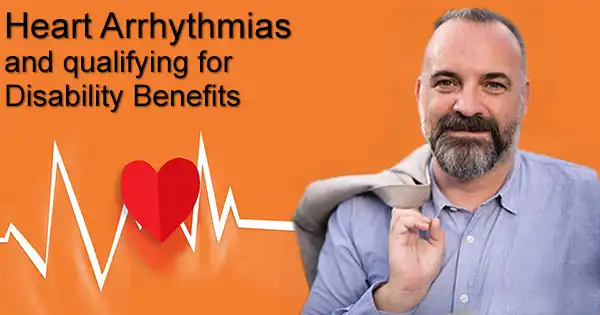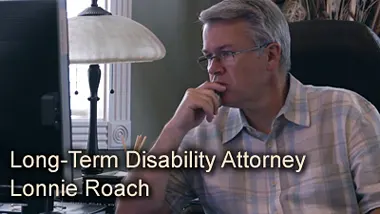Recurrent Heart Arrhythmias and Qualifying for Disability Benefits
Can I get disability benefits if I am suffering from the effects of Recurrent Arrhythmias?
Author: Attorney Lonnie Roach
Updated: 12/19/2023
Summary: Can I get disability benefits if I am suffering from the effects of a Heart Arrhythmias?
First you must meet the SSA’s financial requirement: You must have worked long enough, recently enough, and not made over a predetermined level of income.
Second you must meet the medical requirements:
To qualify for benefits for heart arrhythmias your condition must:
- Cause fainting or loss of consciousness (syncope) or cause an altered consciousness (near syncope) on at least three different occasions in the past 12 months; AND
- An EKG must verify that the arrhythmias are related to fainting; AND
- Episodes of arrhythmia must occur even with treatment; AND
- The arrhythmias must not be the result of a reversible condition; for example, an imbalance of electrolytes.
You must provide Social Security with detailed medical evidence of the last 12 months of treatment to prove the severity of your condition.
According to the Centers for Disease Control, approximately 12.1 million people in the United States experience heart arrhythmias. An arrhythmia is an uneven heartbeat; instead of the heart beating in a normal rhythm, it feels like the heart skipped a beat, added a beat, or is “fluttering.” It may feel like the heart is beating too fast or too slow, or a person may not notice any symptoms at all. If you are unable to work because of heart arrhythmias, you may be eligible for Social Security Disability benefits.

The SSA recognizes Recurrent Arrhythmias as an impairment in its Blue Book. If you or someone you know has Heart Arrhythmia’s they may be eligible for benefits. Get a Free Consultation today! 512-454-4000
According to the Centers for Disease Control, approximately 12.1 million people in the United States experience heart arrhythmias.
An arrhythmia is an uneven heartbeat; instead of the heart beating in a normal rhythm, it feels like the heart skipped a beat, added a beat, or is “fluttering.” It may feel like the heart is beating too fast or too slow, or a person may not notice any symptoms at all.
Treatment may not be needed if arrhythmias are not causing any significant symptoms or putting the person at risk of a serious complication, such as a stroke.
A range of options are available to correct arrhythmias, including anti-arrhythmia drugs, pacemakers, or an implantable cardioverter-defibrillator (ICD), a battery-powered device placed in the chest that monitors heart rhythm and detects irregular heartbeats. Lifestyle changes and techniques to trigger the body to relax can also help control arrhythmias. Demonstrating that you are following your doctor’s treatment plan is an important part of qualifying for disability benefits.
Qualifying for Social Security Disability for Recurrent Heart Arrhythmias
Though many people with recurrent arrhythmias are asymptomatic, some experience frequent and troublesome symptoms.
Many also suffer from depression and anxiety. Though the Social Security Administration lists recurrent arrhythmias in its Blue Book under Section 4.05, there is no guarantee that an applicant will be approved for disability benefits under this diagnosis. You must prove that your medical condition is so severe it prevents you from working at any job, including sedentary work. You must not be working, (or working and earning less than $1550 per month which is Substantial Gainful Activity in 2024), and your condition must last 12 months. If you meet these non-medical requirements, Social Security will then check to see if your disorder meets the requirements of its listing:
4.05 Recurrent arrhythmias, not related to reversible causes, such as electrolyte abnormalities or digitalis glycoside or antiarrhythmic drug toxicity, resulting in uncontrolled (see 4.00A3f), recurrent (see 4.00A3c) episodes of cardiac syncope or near syncope (see 4.00F3b), despite prescribed treatment(see 4.00B3 if there is no prescribed treatment), and documented by resting or ambulatory (Holter) electrocardiography, or by other appropriate medically acceptable testing, coincident with the occurrence of syncope or near syncope (see 4.00F3c).
This means if you do not experience fainting or you are able to control the arrhythmias with medication, it’s unlikely you will be approved for Social Security Disability benefits.
To qualify for SSDI, you must meet all of the following criteria:
- The arrhythmias must cause fainting or loss of consciousness (syncope) or cause an altered consciousness (near syncope) on at least three different occasions in the past 12 months; AND
- An EKG must verify that the arrhythmias are related to fainting; AND
- Episodes of arrhythmia must occur even with treatment; AND
- The arrhythmias must not be the result of a reversible condition; for example, an imbalance of electrolytes.
You must provide Social Security with detailed medical evidence of the last 12 months of treatment to prove the severity of your condition. This should include the following:
- physical exam report;
- detailed medical records;
- EKG results;
- lab reports;
- names of hospitals and clinics where you received treatment; and
- descriptions of treatments and responses to treatment.

If you do not meet all the requirements in the listing, you may still be eligible for Social Security disability benefits.
In this case you should submit an RFC (Residual Functional Capacity) assessment filled out by your doctor stating how your impairment affects your ability to work. For example, because of recurrent arrhythmias you may need to rest throughout the day, or your condition may interfere with your focus, concentration, and ability to keep up with tasks. The form should also include how long you can walk and if you can climb, crawl, or stoop. The Social Security Administration often approves disability on a complete inability to stoop so be sure to report this limitation. Additionally, if you suffer from depression or anxiety and are seeing a psychologist or psychiatrist, include a mental RFC from your doctor. Mental illness can cause problems in focus, getting along with others, and completing tasks.
Using your doctor’s evaluation and their own RFC assessment, Social Security will compare it to the task requirements of your prior job and other jobs to determine if there is any work you are capable of. If Social Security finds that there are no jobs you can do because of your limitations, you will be approved for SSDI.
It is important to note that many people with recurrent arrhythmias also have other illnesses, such as hypertension or kidney disease. By itself one disorder may not meet the requirements of an impairment as stated in Social Security’s Blue Book, but if you have multiple medical conditions, Social Security will consider how those health issues, combined together, limit your ability to hold a job and perform necessary daily tasks.
If you are suffering from the effects of recurrent heart arrhythmias and have been denied disability don’t give up, almost 70% are denied initially! Just call 512-454-4000 for a free, no obligation consultation to learn what your options are. Have some questions? just give us a call, we love to help folks just like you!
In order to qualify for Social Security Disability, you will need to satisfy a few specific requirements in two categories as determined by the Social Security Administration.
The first category is the Work Requirements which has two tests.
- The Duration of Work test. Whether you have worked long enough to be covered under SSDI.
- The Current Work Test. Whether you worked recently enough for the work to actually count toward coverage.
The second category is the Medical Eligibility Requirement.
- Are you working? Your disability must be “total”.
- Is your medical condition severe? Your disability must be “severe” enough to interfere with your ability to perform basic work-related activities, such as walking, sitting, and remembering.
- Is your medical condition on the List of Impairments? The SSA has a “List of Impairments” that automatically qualify as “severe” disabilities. If your disease is not listed this does not mean you cannot get disability, it means you must prove you cannot maintain employment due to your limitations.
- Can you do the work you did before? SSDI rules look at whether your medical condition prevents you from doing the work you did prior to developing the condition.
- Can you do any other type of work? If you cannot do your prior work, an evaluation is made as to whether you can perform any other kind of work.
More details can be found on our Qualifying for Disability page.
A client of ours from Round Rock had congestive heart failure, uncontrolled arrhythmias, and a surgically implanted pacemaker.
This previous heart condition was later complicated by a paralyzed diaphragm that caused chronic Pulmonary Insufficiency. The client was determined to have a Class 5 physical impairment by her treating physician, a Board Certified Cardiologist. She was similarly certified as suffering a Class 5 physical impairment by a Board Certified Pulmonologist. She satisfied Social Security’s criteria for total disability under at least three separate sections. Her pathology was demonstrated by multiple, objective tests and she had been certified as totally disabled by a cardiologist and a pulmonologist.
Despite all of this, Sun Life denied her claim. We handled her appeal got her benefits reinstated.
Disability benefits are an important source of income for those who are unable to work. If you are not able to work due to accident or illness, you may be eligible for Social Security Disability or Long Term Disability benefits. If you have applied for benefits and been denied, contact the attorneys at Bemis, Roach and Reed for a free consultation. Call 512-454-4000 and get help NOW.
Try these links for further reading on this subject:
Chronic Heart Failure and Qualifying for Disability Benefits
Can you get Disability for High Blood Pressure?
Ischemic Heart Disease Disability – You may Qualify


![]()
Your Free Initial Consultation
Call now:
At Bemis, Roach and Reed, if we can't help you, we will try to find the right attorneys for you.
We offer each of our prospective clients a free no obligation one hour phone or office consultation to see if we can help you and if you are comfortable with us. We know how difficult a time like this can be and how hard the decisions are. If we can be of assistance to you and help you find a solution to your issue we will even if that means referring you to another attorney.
Let's get you Started:
If you could provide us with some basic information about your claim we will get right back with you with a free case evaluation and schedule your Free Consultation Today.





